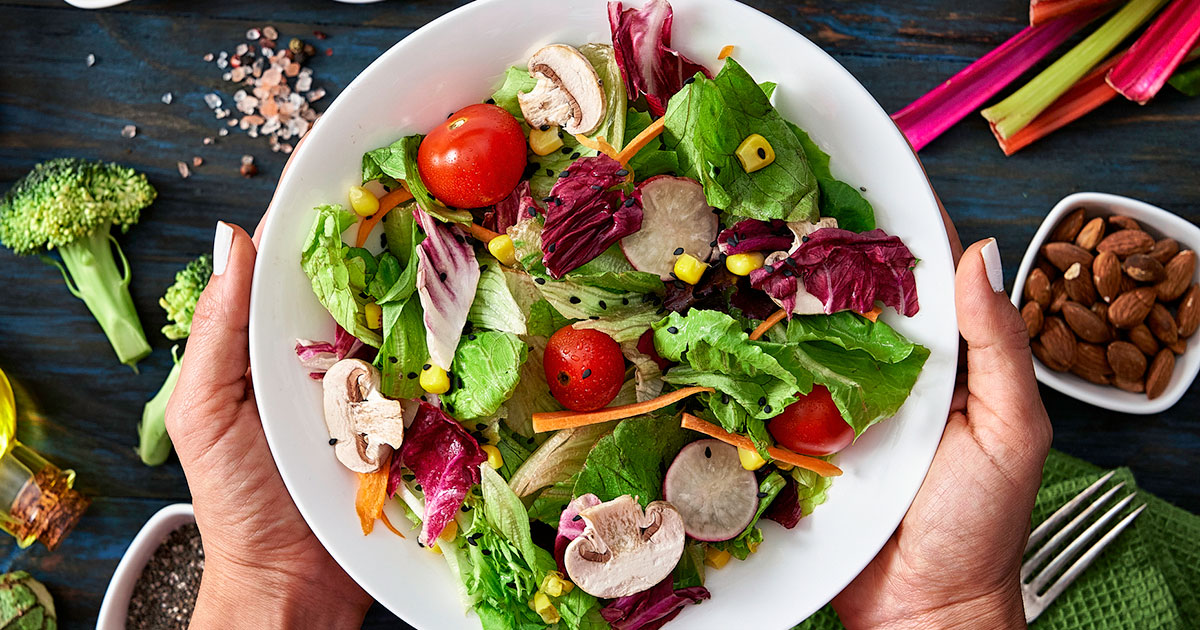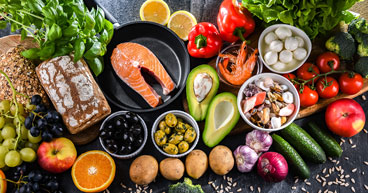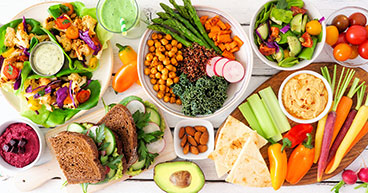
Water is essential for life and critical to keeping our bodies working well. It lubricates our joints, helps us digest food, transports oxygen and nutrients, and protects our organs—and perhaps more importantly, it helps regulate heart rate, blood pressure and body temperature.
However, staying hydrated may be a challenge for patients who are unable to consume enough fluid or who lose too much due to the symptoms of the disease or side effects of treatment. Chemotherapy and radiation therapy may cause fever or gastrointestinal (GI) distress. Loss of appetite and taste changes are also common, which may affect how much you eat and drink, contributing to dehydration.
Certain medications may also play a role. For example, diuretics prescribed to treat high blood pressure and several chemotherapy drugs are designed to increase urination, so taking them may put you at increased risk.
“Hydration is especially important for cancer patients, especially those undergoing treatment,” says Adern Yu, MPH, RD, Director of Clinical Nutrition Services at City of Hope® Cancer Center Duarte. “Many patients are at risk of dehydration due to symptoms like fever, vomiting, and diarrhea, all of which can cause significant fluid loss. Drinking enough fluids helps the kidneys do their job of removing waste from the body. Proper hydration is also essential for overall recovery and ensuring the body's natural detoxification processes work effectively.”
Dietitians often have to get creative to help their cancer patients stay hydrated. That’s why it’s important to know that there’s more than one way to get water, including through the foods we eat.
In this article, we’ll explore:
- The importance of hydration
- The signs of dehydration
- Hydrating foods for cancer patients
- Other hydrating food tips
- Foods and drinks to avoid
- Tips to stay hydrated
If you’ve been diagnosed with cancer and are interested in a second opinion on your diagnosis and treatment plan, call us or chat online with a member of our team.
The importance of hydration
About 60 percent of the body is made up of water. Keeping the body well hydrated reduces the risk of challenges like kidney and urinary tract infections or constipation. Even healthy people need to drink plenty of water each day to stave off the negative effects of dehydration.
There’s no one-size-fits-all answer to how much water each person needs. It may vary based on several factors, including age, gender, physical activity level and overall health. Your doctor can help you determine the right amount for you.
However, a good rule of thumb for healthy individuals is to drink between eight and 10 eight-ounce glasses of water a day, says Kayla Morgiewicz, MS, RD, Advanced Dietitian at City of Hope Chicago. That’s roughly four to five 16.9-ounce bottles a day.
If you’re looking for a more specific guideline to follow, aim to drink between half an ounce to an ounce of water per pound of body weight each day. For example, if you weigh 150 pounds, you should try to drink between 75 to 150 ounces of water a day. That could change, though, if you live in a hot climate or are very physically active.
There’s also no hard-and-fast rule for how much water cancer patients need. “I don’t give a general, overall recommendation because it’s specific to each patient and what his or her treatment entails,” Morgiewicz says, “but we go over hydration, in general, because a lot of patients are having diarrhea or vomiting as part of chemotherapy, so it’s essential that we replenish those fluids.”
As long as your tap water is safe to drink, there’s no need to buy bottled water. Bottled water is not always better quality. It also costs more, wastes energy and puts millions of empty bottles into the garbage.
The signs of dehydration
Your body alerts you to dehydration in several ways, and it doesn’t always involve feeling thirsty. One of the best ways to monitor for dehydration, in fact, is to check the color of your urine. In general, the darker the color, the more dehydrated you are.
Patients and their caregivers should recognize the signs and symptoms of dehydration in adults, including:
| Mild | Moderate | Severe |
|---|---|---|
| Fatigue or exhaustion | Dark yellow urine | Nausea and vomiting |
| Weakness or light-headedness | Decrease in urination | Extreme thirst |
| Dizziness or feeling faint | Dry skin and lips | Unable to sweat |
| Constipation | Headaches | Disorientation or confusion |
| Rapid heartbeat | ||
| Low blood pressure |
Hydrating foods for cancer patients
One of the biggest challenges for cancer patients who struggle with taking in enough water and nutrients is finding palatable foods they can keep down. But you can sneak water into your diet in lots of ways. For example, 20 percent of the water we take in each day comes from the foods we eat. Even a slice of pizza is 40 to 49 percent water.
Still, it’s probably not a surprise that some of the best hydrating foods are fresh fruits and vegetables. Most are made up of 90 percent water or more. Vegetables also contain phytochemicals, which are natural compounds found in plants that contain antioxidants and anti-inflammatory properties and help fight free radicals—unstable molecules in the body believed to have the potential to cause cell or DNA damage—and prevent disease.
Below are 10 hydrating foods and ways to incorporate them into your diet.
Apples
Apples, which are 84 percent water, rank among the top fruits produced in the world and are a good source of vitamin C and fiber. They’re also rich in the flavonoid quercetin, a type of naturally occurring plant chemical that has antioxidant and anti-inflammatory properties, and pectin, a type of fiber that may help prevent constipation and lower LDL (low-density lipoprotein), or bad cholesterol.
You can cut apples up for an easy snack (and spread them with low-fat cheese or nut butter for extra flavor) or add them to salads or soups.
Asparagus
Roughly 92 percent water, asparagus is a good source of zinc and vitamins A and K. It also contains fiber and carbohydrates that may help regulate digestion, blood sugar and fat absorption.
Asparagus is delicious when served fresh in salads or lightly seasoned as a side dish. It can also be steamed, boiled, stir-fried or grilled.
Celery
Celery, which is 95 percent water, isn’t particularly high in any vitamin or mineral, but it’s a good source of vitamin K. It also contains folate, potassium, fiber and small amounts of vitamins A, B and C.
Enjoy raw celery with dips or peanut butter, or you can add it to salads and sandwiches, braise it, juice it or use it in soups.
Cucumbers
Cucumbers are 96 percent water and contain a host of vitamins, minerals, carbohydrates and trace metal elements that help the body metabolize foods. Some of these nutrients include vitamins B and C, folic acid, calcium, iron, magnesium, phosphorous, potassium and zinc.
You can incorporate cucumbers into your diet in all sorts of ways. One of the main ways, though, is simply adding chopped cucumbers to salads and sandwiches. You can eat them as a side with a dressing or dip, or even hide them in a smoothie.
Lettuce
Lettuce is also 96 percent water. It contains numerous nutrients, including vitamins A, C and K, as well as folate and potassium.
Lettuce provides tons of health benefits, including providing antioxidants, promoting heart and immune health and reducing cancer risk. As the core ingredient in most salads, lettuce isn’t hard to add to your diet. Plus, it’s a great addition to sandwiches and wraps. Just remember that the darker the leaves, the more nutrient-rich the lettuce.
Mushrooms
Depending on the type, mushrooms are between 80 percent and 92 percent water. They’re full of vitamins, minerals and antioxidants—and they’re versatile. You can eat them raw or chop them up and disguise them as meat in burgers and meatballs. You can also slice them and add them to salads, cream them for soups, sauté or grill them as a side, or fill them with tomato sauce and sprinkle them with mozzarella cheese and oregano.
Spinach
Spinach, at 92 percent water, has dark, leafy greens that help the skin, hair and bones stay healthy. Spinach also provides nutrients like protein, iron, vitamin C and E, iron, potassium and magnesium.
Perhaps most nutritious when served fresh in salads or hidden in smoothies and juices, spinach is also a fun addition to egg dishes, soups and stews.
Tomatoes
Tomatoes are 94 percent water and rich in nutrients. They’re loaded with vitamin C, potassium and antioxidants like lycopene, which has been linked to a reduced risk of heart disease.
You can enjoy tomatoes by adding them to wraps, sandwiches, sauces and salsas. Cooking tomatoes also appears to increase nutrient intake. For example, stewed tomatoes have more lutein and zeaxanthin (plant-producing pigments called carotenoids) than sun-dried tomatoes or raw cherry tomatoes.
Watermelon
Made up of 92 percent water, watermelon is packed with antioxidants like lycopene and vitamins A and C.
Add watermelon to smoothies, salsas and salads, or pair it with cheeses, nuts and other proteins. Or eat it raw as a salad or dessert.
Zucchini
Summer squashes, including zucchini, are about 94 percent water. Technically a fruit, zucchini, which is rich in antioxidants and micronutrients, is an excellent source of vitamin C and the trace mineral manganese, as well as potassium and magnesium. It’s also high in fiber and may help improve overall gut health.
You can add summer squashes like zucchini to your diet in many ways, including puréeing them and adding them to soups. You can also add them to salads and sandwiches, spiralize them into noodles, bake them into bread or just eat them plain.
Other hydrating food tips
Of course, you don’t have to limit your diet to only the foods above. Take prunes, for example. You may not like the taste, but if you like oranges, which are 87 percent water and contain lots of vitamin C, you can mix plum juice with orange juice for hydration benefits, Morgiewicz says.
You can also find oral rehydration formulas on the market, like Liquid I.V.® Hydration Multiplier® or DripDrop® Dehdyration Relief Fast™. These solutions are made up of water, sugar and electrolytes—specifically, potassium and sodium.
Another way to make hydration more enticing is by using water infusions, Morgiewicz says. These products add fruit or herbal flavors to your water.
Waters and beverages with electrolytes may be helpful to patients struggling with side effects. Electrolytes are minerals, including sodium, chloride, potassium, magnesium and calcium, that are critical in maintaining key body functions.
“Water is the best option for staying hydrated,” Yu says. “However, for those looking to add extra calories and protein to their diet, high-protein smoothies and shakes can be a great alternative. They not only provide hydration but also offer a convenient way to incorporate fruits and vegetables into your daily routine.”
Avoid sport drinks that are high in sugar, Yu says.
Some foods, like citrus fruit, are also rich in electrolytes. Speak with your dietitian to discuss which foods high in water and electrolytes might be worth adding to your nutrition plan.
Foods and drinks to avoid
While you can get water from the foods you eat in lots of ways, you should avoid certain foods that may negatively impact hydration. These include products like high-salt foods, caffeine and alcohol.
Still, for cancer patients who have trouble swallowing or keeping certain foods down, the list of foods and drinks to avoid is short. “I wouldn’t restrict too much when, truly, any nutrition is better than nothing, oftentimes,” Morgiewicz says. “And each person’s diagnosis and treatment plan are different, so their diet should be, too.”
Tips for staying hydrated
Start when you wake up. Your body needs rehydrating after 6-8 hours of sleep, so keep a glass of water on your nightstand.
Drink small amounts of fluids as often as you can. You should try to drink a total of about 8 to 10 cups of liquids a day. You may need more if you have diarrhea or have recently vomited.
Keep a reusable water bottle with you. This makes it easier to drink sips throughout the day instead of trying to chug large amounts before bedtime, which can disrupt sleep.
Fill a pitcher with your daily consumption. Keep it in your fridge or near your workspace as a reminder.
Create a water routine. Develop a schedule of times during the day to refill so you can hold yourself accountable. Use your phone’s alarm clock to set reminders.
Use different cues to remind you to drink, such as setting a timer. Ask family and friends to encourage or remind you to drink more fluids.
Track your progress on an app. Check your app store for free options to help you stick to a hydration plan.
If you’ve been diagnosed with cancer and would like to learn more about your treatment options, or if you’re interested in a second opinion about your cancer diagnosis and treatment plan, call us or chat online with a member of our team.



